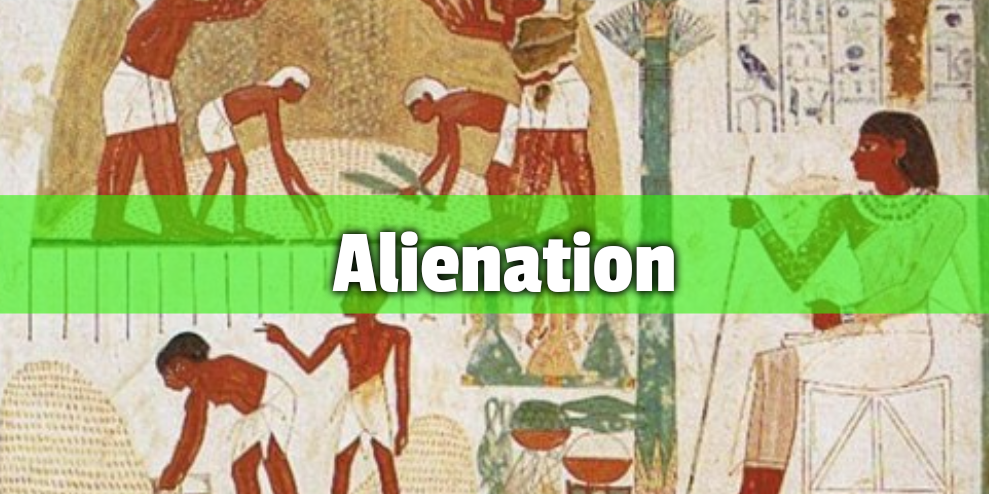Alienation

A fracture, due to historically specific social relations, between the self-consciousness of the species and its own needs and nature. Alienation is a product of the division of humanity into classes which makes humanity appear to be opposed to the result of its work and therefore opposed both to itself and to Nature as a whole.
Origins
The division of society into classes, which probably occurred some 6,000 years ago, is a recent phenomenon in the life of a species that has been on the planet for 500,000 years and for most of that time lived under a regime of primitive communism based on a hunting, fishing and gathering economy. The communal regime was maintained in the early cities* and it seems that cities organized around certain forms of primitive communism survived in Europe until as recently as the 4th century BCE**. But the division into classes was inevitable with the development of the productive forces that was taking place with the new technology. It was certainly a leap forward in the progress of the species, but it also meant a profound trauma. The myths of a previous "Golden Age" have survived to this day, sprinkling religions and beliefs, which were themselves born to alleviate that painful division of the species, so explosive that a specialized and costly social body, the state, had to appear to keep the social whole minimally cohesive under the new type of dominant productive relations: exploitation.
With the fracture of society between exploited and exploiting classes, the division between personal and social work appears, the sexual division of work and the division between manual and intellectual work. Private property sets objects against the members of the society that produced them and these members against each other. City and countryside become opposed to each other. The consciousness of the species is split. From the diffuse animism of primitive communism that tried to represent the then incomprehensible natural cycles, one passes to the theogonies of superior and ruling gods that abstract the vengeful, parasitic and brutal character of the first dominant classes. With the separation between work and life, between social community and productive community, life itself breaks down and flees to the heavens. Beliefs in the "afterlife" spread. The human has become alienated from the humanity, it has "alienated" itself.
The proletariat as the ultimate expression of alienation
If agricultural regimes were fundamentally based on levies, on extra-economic exploitation by means of taxes or duties, capitalism integrates exploitation into the very heart of social relations. As labor is commodified and surplus value is consecrated as the basis of the system of accumulation, exploitation itself becomes invisible, the division into classes is presented as "natural". And at the same time, the contradiction intrinsic to private property -the opposition between producers and product- becomes universal: in a capitalist society crises of "overproduction" are accompanied by the pauperization of large masses of the proletariat. The exploited class is thus universally denied: the very exploitation that defines it is denied, and its own conditions of existence as a class are denied by the contradictions of the system.
This revolution is carried out by the class which society does not consider as such, does not recognize as a class and already expresses the dissolution of all classes, nationalities, etc., within the present society
Marx and Engels. The German Ideology, 1846
It is this total denial that makes the proletariat a universal class, because only by raising the generic human needs can it get out of its situation In the fully developed proletariat, all humanity, even the appearance of humanity, is abstracted; in the conditions of existence of the proletariat, all the conditions of existence of today's society are condensed in their most inhuman form; Man has lost himself, but, at the same time, he has not only acquired a theoretical consciousness of that loss, but has been directly constrained, by the misery which is henceforth inescapable, impossible to palliate, absolutely imperative -by the practical expression of need- to rebel against that inhumanity; and it is for all this that the proletariat can free itself.
But it cannot free itself without suppressing its own conditions of existence. It cannot suppress its own conditions of existence without suppressing all the inhuman conditions of existence in today's society that are condensed into its situation. It is not in vain that he goes through the rude but fortifying school of work.
Marx and Engels. The Holy Family, 1844
Communism as an end to alienation
The proletariat denying itself as a class through revolution, pushing the whole society toward communism, is the denial of a denial. It offers therefore the only possible way out for Humanity, its affirmation as such and with it the overcoming of alienation. Communism, a society without division of labor and without class division, "the real beginning of human history," means the end of all division created by class division and therefore the end of social alienation. Marx realizes this very soon, in 1844, when he is preparing the notes that will serve as the basis for the core of his work.
http://dictionary.marxismo.school/AlienationCommunism as a positive overcoming of private property as man's self-alienation, and therefore as a real appropriation of the human essence by and for man; therefore as man's return to himself as a social man, that is, a human being; a full, conscious and effected return within the whole richness of human evolution up to the present. This communism is, as complete naturalism = humanism, as complete humanism = naturalism; it is the true solution of the conflict between man and nature, between man and man, the definitive solution of the dispute between existence and essence, between objectification and self-assertion, between freedom and necessity, between the individual and the [human] race. It is the solved enigma of history and it knows that it is the solution.
Karl Marx. Economic and Philosophical Manuscripts, 1844